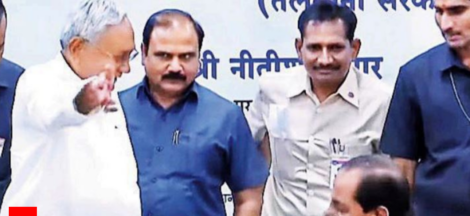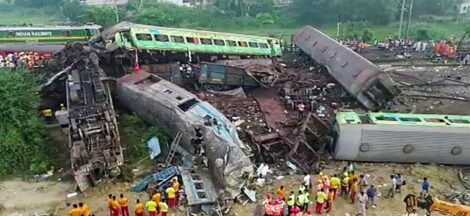By Gyan Pathak
Prime Minister Narendra Modi is right in his insistence on implementing universal financial inclusion programmes in the country to improve the living conditions of our people, but has proved himself ignorant of the brewing crisis in India’s financial sector, particularly the banking sector. He should have tried first to strengthen the banking sector, which dominates the financial sector by making it scam and corruption free, and compelling it to improve its beleaguered balance sheet having persistent deterioration in the asset quality. He was even wrong in his assessment that his financial inclusion programmes could be successfully implemented by ailing banks.
When he insisted on implementing Jan Dhan Yojna, under which accounts were to be opened on zero balance, the banks implemented it though initially they were hesitant. Modi knew that it was not his cup of tea as leader of the government to give financial security to all the citizens; that is why he pinned his hope on the banking sector to give access to financial tools to all the citizens so that they can get money from the banks and do something for their livelihood. However, he ignored the fraudulent Modis, who had the real access to the financial tools while the people in general have little access, for reasons best known to bank officers and the people who are interested in only giving and taking bad debts.
In such a situation programmes like Pradhan Mantri Jeevan Jyoti Yojna (PMJBY), Pradhan Mantri Suraksha Beema Yojna (PMSBY), Atal Pension Yojna (APY), Pradhan Mantri Mudra Yojana (PMMY), Micro Units Development and Refinance Agency (MUDRA), Stand Up India Loan Programme, National Rural Livelihood Mission (NRLM), Aajeevika Skill Development Programme (ASDP), Micro Financing to Self Help Groups (SHGs) and Joint Liability Groups (JLGs), Financing Small and Medium Enterprise, and several others are performing very badly. Everybody knows how our banks are functioning. How come our Prime Minister did not know about the disturbing facts of the bad debts, majority of which are fraudulent? To cover up his own faults, he is trying to blame his political adversaries like Congress, which is nothing but political expediency.
What is happening in the banking sector during his regime is also worth noting. During 2016-17, bank credit accounted for 35 per cent of the total flow of financial resources to the commercial sector. The persistent deterioration in the asset quality has dented the profitability and constrained the financial intermediation power of the banks. Consequent deleveraging has resulted in historically low credit growth. The subdued demand, especially from industry, has also restrained credit off-take. Demonetisation of specified bank notes (SBNs) in November 2016 further impacted the banking sector’s performance in the form of a surge of low-cost deposits and abundance of liquidity in the system. It speeded up interest rate reduction and altered banks’ balance sheet structures. The policy experiment of the Prime Minister deteriorated the health of the ailing banking system. He never thought that money is not only illegally kept by some big people but it is also siphoned off illegally from our banks too at the cost of financial security to the general public.
For resolution of stressed assets of the banks and reviving credit flow to the production sector, the government has initiated several statutory measures and institutional reforms, and all the 94 scheduled commercial banks are working for it. What will happen to the big people who have just kept the loans not to return to the banks is not known, but it is known that the banks have started charging for all conceivable services to the general people, who are at the receiving end of the enforced policy of cashless transactions and paperless works. Even the core functions of deposit and withdrawal have become costlier under the Modi regime. Banks and the government seem keener on extracting money from the people while taking no responsibility for the financial security of the people, or banks’ money, or government exchequer.
The characteristic failure of the Modi government’s performance resulted in slowing economic activities in industries and business, which in turn subdued demand of credit from banks. By 2016-17, credit growth failed to a record low of 2.8 per cent, pulled down by persistent decline in asset quality. It necessitated a sharp increase in provisioning requirements. As a consequence, banks’ profitability was adversely impacted and risk aversion set in.
In the post-demonetisation period, the persisting deceleration in credit and the sizeable influx of deposits, the credit-deposit (C-D) ratio of banks on an outstanding basis, sharply declined to 73 per cent as at end-March 2017 from 78.2 per cent in the previous year. The decline in credit turned PSBs and FBs’ incremental C-D ratios negative.
The asset quality of banks had deteriorated further during the year with the gross non-performing assets (GNPA) ratio reaching 9.3 per cent of total advances. Public sector banks’ (PSBs’) GNPA ratio rose to 11.7 per cent by March 2017. The net NPA ratio, which is an indicator of the quality of the loan book as it is adjusted for provisions, rose to more than 5 per cent. Such a sharp deterioration in the asset quality of banks has happened under the present rule, which adversely impacted the lending capacity of the banks, putting the financial security of people at great risks along with all related programmes. (IPA Service)
The post Banking Crisis Fails Financial Inclusion Programmes appeared first on Newspack by India Press Agency.


